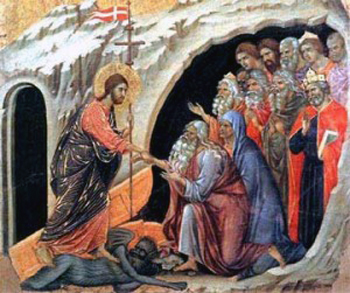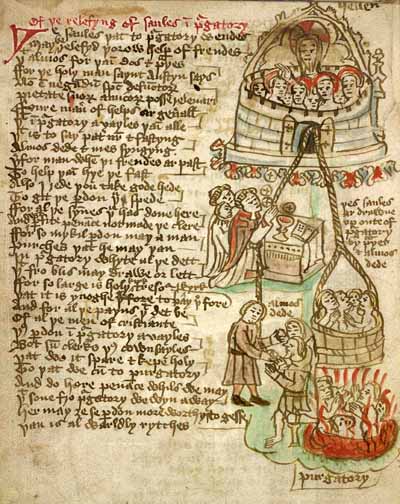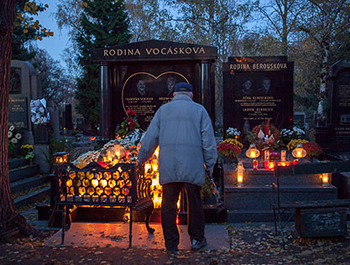Faith under Attack
 |
 |
 |
 |
 |
 |
 |
On Purgatory - Part IV
The Location of Purgatory &
Help from the Poor Souls
While our faith reveals nothing definitively about the location of Purgatory, the most common opinion held by theologians that most agrees with Sacred Scriptures is that Purgatory is placed in the bowels of the earth, not far from Hell. St. Robert Bellarmine concurs with this in his Catechism.(1)
The three lower places or hells
The words we say in the Apostles Creed “He descended into Hell” are often simplified. The English word hell, or, in Latin inferos, the Catechism of the Council of Trent tells us, signifies the inferior or lower places where the souls who have not reached Heaven are detained. These inferior places are three: Limbo, Purgatory and the Hell of the reprobates also called Gehenna.
 In this Gehenna, the damned are continually tormented by devils and by a fire that is never extinguished.
In this Gehenna, the damned are continually tormented by devils and by a fire that is never extinguished.
Purgatory is another lower place where souls suffer a physical fire to expiate for all their sins, so that they may be entirely purified before being transferred to Heaven to enjoy the Beatific Vision.
The third lower place is the Limbo of the Patriarchs or Limbo of the Fathers (limbus patrum), where the souls of the saints who died before the coming of Christ were received. There they enjoyed peaceful repose, exempt from pain, consoled and sustained by the promise of redemption. It was into this place that Our Savior descended after His death to deliver the souls waiting there. Thus, Christ fulfilled the promise He gave to the good thief Dismas, who died before Him: “This day thou shalt be with me in Paradise.” (2)
There is also the Limbo of unbaptized infants (limbus infantium). The Catholic Encyclopedia tells us that this is where the souls of infants and others who die without grievous sin or personal guilt are detained. They are excluded from the beatific vision because original sin has not been removed from their souls, but they suffer no pain and enjoy a perfect natural happiness.
St. Thomas Aquinas admits, like other Church Doctors, that Divine Justice permits certain souls in Purgatory to appear to instruct the living or to procure suffrages needed by those souls. (3)
Fr. Schouppe leaves the proof regarding the location of Purgatory to theologians like Suarez and Bellarmine. He contents himself with the argument of geologists who affirm the interior of the earth may be entirely of fire. Thus, Schouppe concludes, there is nothing to prevent it from serving as a sojourn of spirits. For if angels and other spirits can inhabit our atmosphere, why cannot the souls of the dead dwell in the bosom of the earth? (4)
This is further attested by St. Teresa of Avila, who used to assist the souls in Purgatory by her prayers and good works. She saw many of these souls at the moment of their release from suffering and entrance into Heaven. She wrote: “They generally come forth from the bosom of the earth.” (5)
The great good of helping the Poor Souls
By means of Divine Mercy, Catholics have it in their power to assist the Poor Souls through suffrage. While the means are powerful, they are generally sadly neglected, especially after Vatican II when almost nothing is preached from the pulpits on Purgatory. Consequently, most Catholics do little or nothing for the departed due to either ignorance or lack of fervor.
 The principal cause of this sad forgetfulness is the lack of reflection and loss of sight of the great motives urging charity toward the dead. These motives are revealed to us by the Holy Ghost: “It is a holy and wholesome thought to pray for the dead, that they may be loosed from their sins,” (2 Mach 12:46) that is, from the temporal punishment due to their sins.
The principal cause of this sad forgetfulness is the lack of reflection and loss of sight of the great motives urging charity toward the dead. These motives are revealed to us by the Holy Ghost: “It is a holy and wholesome thought to pray for the dead, that they may be loosed from their sins,” (2 Mach 12:46) that is, from the temporal punishment due to their sins.
St. Augustine states: “One of the holiest works, one of the best exercises of piety that we can practice in this world is to offer sacrifices, alms and prayers for the dead.” (6) St. Jerome says briefly, “The relief which we procure for the departed obtains for us a similar mercy.”
In his Summa, St. Thomas Aquinas teaches: “Suffrages for the dead are more agreeable to God than suffrages for the living, because the former stand in more urgent need thereof, not being able to assist themselves, as are the living.” (7)
"To assist the souls in Purgatory," says St. Francis de Sales, " is to perform the most excellent of the works of mercy; or rather, it is to practice in a most sublime manner all the works of mercy together. It is to visit the sick; it is to give drink to those who thirst for the vision of God; it is to feed the hungry, to ransom prisoners, to clothe the naked, to procure for poor exiles the hospitality of the Heavenly Jerusalem; it is to comfort the afflicted, to instruct the ignorant - in short, to practice all works of mercy in one." (8)
Finally, to move us there are these touching words in Job (19:21), habitually placed on the parched lips of the Poor Souls: “Have pity on me, have pity on me, at least you, my friends.”
Advantages of devotion to the Poor Souls
If we were to understand the gratitude of the Holy souls for our suffrages, we would be overwhelmed. Their appreciation surpasses anything we perceive upon earth.
St. Margaret of Cortona had great devotion to the Poor Souls. At her death she saw the multitude of souls that she had delivered from Purgatory forming a procession to escort her to Paradise. God revealed this favor given to Margaret to a holy person in the city of Castello, Italy, who saw the soul of St. Margaret after her death in the midst of the brilliant cortege ascending into Heaven. (9)
St. Philip Neri also had a great devotion toward the Poor Souls, and God confided those Souls who had been under his spiritual direction in a special way to his zeal. He revealed that many of his spiritual children appeared to him after their deaths, either to ask his prayers or to profoundly thank him for what he had already done for them. He added that through the Poor Souls he had obtained many graces. (10)
The gratitude of the Poor Souls sometimes manifests itself in a clear and visible manner, but most frequently they express their gratitude invisibly by prayers for their benefactors. Although they cannot pray for themselves, they can nonetheless obtain grace for us.
 Such is the teaching of the eminent theologians St. Robert Bellarime and Fr. Suarez. The latter states: “These souls are holy and dear to God. Charity urges them to love us and know at least in a general way to what dangers we are exposed and the need we have of divine assistance. Why would they not pray for their benefactors?” (11)
Such is the teaching of the eminent theologians St. Robert Bellarime and Fr. Suarez. The latter states: “These souls are holy and dear to God. Charity urges them to love us and know at least in a general way to what dangers we are exposed and the need we have of divine assistance. Why would they not pray for their benefactors?” (11)
St. Catherine of Bologna often asked help from the souls for whom she frequently prayed. She advised others to do the same, saying: “When I wish to obtain any favor from our Father in Heaven, I have recourse to the souls that are detained in Purgatory. I entreat them to present my request to the Divine Majesty in their own name, and I feel that I am heard through their intercession.”
The great Cure d’Ars, St. John Vianney, likewise encouraged those who consulted him to ask the help of the Poor Souls: “Oh! If it were but known how great is the power of the good souls in Purgatory before the Heart of God! And if we knew all the graces we can obtain through their intercession, then they would not be so much forgotten. We must, therefore, pray much for them, that they may pray much for us.” (12)
We should have no doubt that upon their entrance into eternal glory the first favors the delivered Poor Souls ask of Divine Mercy are for those who have opened to them the gates of Paradise. Let us not, then, fail to pray for them, for they will never fail to pray for their benefactors, especially when they see them in any need or danger.
Continued

The three lower places or hells
The words we say in the Apostles Creed “He descended into Hell” are often simplified. The English word hell, or, in Latin inferos, the Catechism of the Council of Trent tells us, signifies the inferior or lower places where the souls who have not reached Heaven are detained. These inferior places are three: Limbo, Purgatory and the Hell of the reprobates also called Gehenna.

Our Lord descended into the Limbo of the Fathers to release the souls waiting there
Purgatory is another lower place where souls suffer a physical fire to expiate for all their sins, so that they may be entirely purified before being transferred to Heaven to enjoy the Beatific Vision.
The third lower place is the Limbo of the Patriarchs or Limbo of the Fathers (limbus patrum), where the souls of the saints who died before the coming of Christ were received. There they enjoyed peaceful repose, exempt from pain, consoled and sustained by the promise of redemption. It was into this place that Our Savior descended after His death to deliver the souls waiting there. Thus, Christ fulfilled the promise He gave to the good thief Dismas, who died before Him: “This day thou shalt be with me in Paradise.” (2)
There is also the Limbo of unbaptized infants (limbus infantium). The Catholic Encyclopedia tells us that this is where the souls of infants and others who die without grievous sin or personal guilt are detained. They are excluded from the beatific vision because original sin has not been removed from their souls, but they suffer no pain and enjoy a perfect natural happiness.
St. Thomas Aquinas admits, like other Church Doctors, that Divine Justice permits certain souls in Purgatory to appear to instruct the living or to procure suffrages needed by those souls. (3)
Fr. Schouppe leaves the proof regarding the location of Purgatory to theologians like Suarez and Bellarmine. He contents himself with the argument of geologists who affirm the interior of the earth may be entirely of fire. Thus, Schouppe concludes, there is nothing to prevent it from serving as a sojourn of spirits. For if angels and other spirits can inhabit our atmosphere, why cannot the souls of the dead dwell in the bosom of the earth? (4)
This is further attested by St. Teresa of Avila, who used to assist the souls in Purgatory by her prayers and good works. She saw many of these souls at the moment of their release from suffering and entrance into Heaven. She wrote: “They generally come forth from the bosom of the earth.” (5)
The great good of helping the Poor Souls
By means of Divine Mercy, Catholics have it in their power to assist the Poor Souls through suffrage. While the means are powerful, they are generally sadly neglected, especially after Vatican II when almost nothing is preached from the pulpits on Purgatory. Consequently, most Catholics do little or nothing for the departed due to either ignorance or lack of fervor.

A page from a medieval manuscript illustrates the good of assisting the Poor Souls
St. Augustine states: “One of the holiest works, one of the best exercises of piety that we can practice in this world is to offer sacrifices, alms and prayers for the dead.” (6) St. Jerome says briefly, “The relief which we procure for the departed obtains for us a similar mercy.”
In his Summa, St. Thomas Aquinas teaches: “Suffrages for the dead are more agreeable to God than suffrages for the living, because the former stand in more urgent need thereof, not being able to assist themselves, as are the living.” (7)
"To assist the souls in Purgatory," says St. Francis de Sales, " is to perform the most excellent of the works of mercy; or rather, it is to practice in a most sublime manner all the works of mercy together. It is to visit the sick; it is to give drink to those who thirst for the vision of God; it is to feed the hungry, to ransom prisoners, to clothe the naked, to procure for poor exiles the hospitality of the Heavenly Jerusalem; it is to comfort the afflicted, to instruct the ignorant - in short, to practice all works of mercy in one." (8)
Finally, to move us there are these touching words in Job (19:21), habitually placed on the parched lips of the Poor Souls: “Have pity on me, have pity on me, at least you, my friends.”
Advantages of devotion to the Poor Souls
If we were to understand the gratitude of the Holy souls for our suffrages, we would be overwhelmed. Their appreciation surpasses anything we perceive upon earth.
St. Margaret of Cortona had great devotion to the Poor Souls. At her death she saw the multitude of souls that she had delivered from Purgatory forming a procession to escort her to Paradise. God revealed this favor given to Margaret to a holy person in the city of Castello, Italy, who saw the soul of St. Margaret after her death in the midst of the brilliant cortege ascending into Heaven. (9)
St. Philip Neri also had a great devotion toward the Poor Souls, and God confided those Souls who had been under his spiritual direction in a special way to his zeal. He revealed that many of his spiritual children appeared to him after their deaths, either to ask his prayers or to profoundly thank him for what he had already done for them. He added that through the Poor Souls he had obtained many graces. (10)
The gratitude of the Poor Souls sometimes manifests itself in a clear and visible manner, but most frequently they express their gratitude invisibly by prayers for their benefactors. Although they cannot pray for themselves, they can nonetheless obtain grace for us.

A man visits a cemetery in Prague to light candles and pray for his deceased loved ones
St. Catherine of Bologna often asked help from the souls for whom she frequently prayed. She advised others to do the same, saying: “When I wish to obtain any favor from our Father in Heaven, I have recourse to the souls that are detained in Purgatory. I entreat them to present my request to the Divine Majesty in their own name, and I feel that I am heard through their intercession.”
The great Cure d’Ars, St. John Vianney, likewise encouraged those who consulted him to ask the help of the Poor Souls: “Oh! If it were but known how great is the power of the good souls in Purgatory before the Heart of God! And if we knew all the graces we can obtain through their intercession, then they would not be so much forgotten. We must, therefore, pray much for them, that they may pray much for us.” (12)
We should have no doubt that upon their entrance into eternal glory the first favors the delivered Poor Souls ask of Divine Mercy are for those who have opened to them the gates of Paradise. Let us not, then, fail to pray for them, for they will never fail to pray for their benefactors, especially when they see them in any need or danger.
Continued
- Apud Fr. F. X. Schouppe, Purgatory Illustrated by the Lives and Legends of the Saints, NY: Benzinger Bros., 1893, p. 5
- Ibid., pp., 5-6
- Thomas Aquinas, Summa Theologica, 1 Supplement., part. III, Quest. Ult., apud ibid.
- Ibid.
- Ibid., p. 7.
- St. Augustine, Homilia 16, apud Fr. Schouppe, Purgatory Illustrated, p. 216
- St. Thomas Aquinas, Summa Theologica, Supplement, Q 71, art 5, apud ibid., p. 217.
- Apud Fr, Schouppe, Purgatory Illustrated, p. 217.
- Ibid., pp. 248-249.
- Ibid.
- Ibid., pp. 263-264.
- Ibid., p. 265.

Posted January 13, 2013
______________________
______________________





